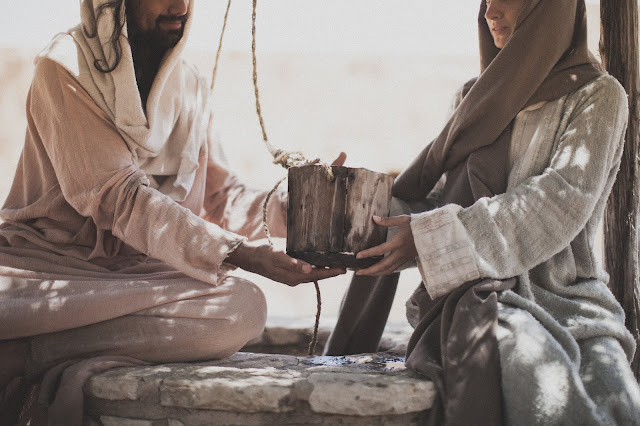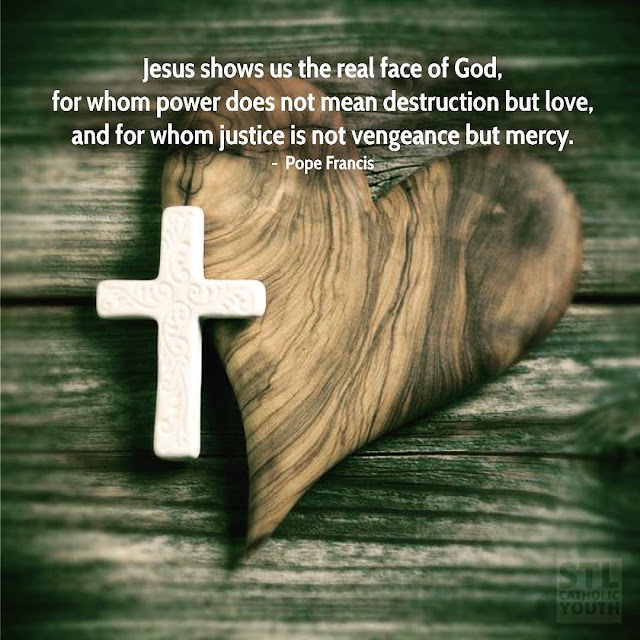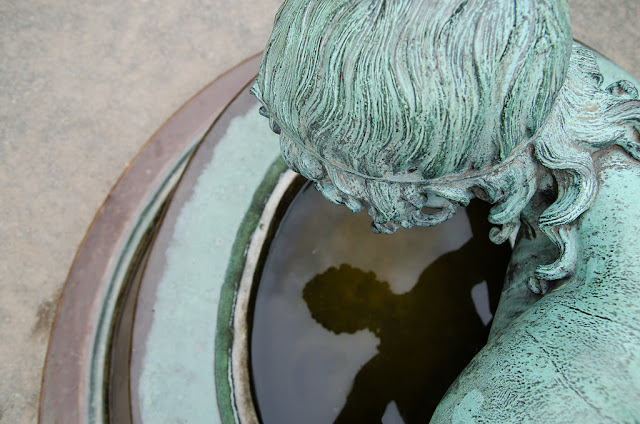What Is Mercy?
The Hebrew term for mercy is chesed (hesed), which signifies God's loving-kindness and graciousness. Hebrew texts use this word to represent the steadfast, unfailing, covenant love of God toward His chosen people, Israel.
The Greek most often utilizes the word eloeos, which signifies God's compassion upon humankind.
To simply say that God is merciful implies an attribute of God rather than the total essence and nature of His Being. Rather, Pope Francis declares in the title of his book: THE NAME OF GOD IS MERCY.
For that reason, God doesn't turn mercy on and off like we do. Mercy is the foundation of His covenant with Abraham. Unlike a human contract, God's Covenant manifests a relational commitment to His people regardless of our reciprocal ability to commit to Him. Mercy delivered Israel from slavery and redeemed mankind from sin. Mercy continues to initiate and sustain His ongoing relationship with us. Mercy pursues, abides and never ceases, because that’s Who God Is!
At creation, Mercy walked in the garden with Adam and Eve. Mercy abounds in the Tree of Life, but Adam & Eve chose to eat from the forbidden tree instead -- the Tree of Judgment. God had warned Adam and Eve that they would die if they ate from the forbidden tree. Indeed, the Tree of the Knowledge of Good and the Knowledge of Evil includes judgment, which eradicates mercy.
Mercy is not contingent upon anything; judgment demands contingencies. For example, the Law confers knowledge of what is good and judges what is evil, and thus, fosters judgment and often punitive consequences. That's how the Law functions as inherently from the Knowledge of Good and Evil.
For sure, humankind needs laws for protection and some semblance of civility; the Mosaic Law provided that. The Law of Moses was the forerunner of all religion and determined righteousness and sin prior to Jesus. In fact, the Law clearly demonstrated that we couldn't save ourselves by perfectly keeping the Law and needed a Savior to do it for us. Thus, Jesus fulfilled the Law.
Whereas, religion entails judgment; Mercy overrides judgment. You can't earn God's Mercy, but you can cry out for God's mercy to save you. Therefore, God's mercy is more than something that we can earn by acting righteously; it's bestowed when we admit that we're powerlessness and dependent on God's righteousness to save us.
God's Divine Mercy becomes incarnate in Jesus Christ, so that we can know the Father personally. Jesus came to fulfill all that was written in the Law and the Prophets. All of Scripture points to Him, even where it's not explicitly prophetic. Ultimately, Christ accomplished what the Law required of us.
For Christ has already accomplished the purpose for which the law was given. As a result, all who believe in him are made right with God. (Romans 10: 4)
Moreover, God Incarnate reconciled sin and judgment and provided us with the means to overcome them through His resurrection from the dead. On the cross, Jesus also absorbed all our human limitations, sufferings, and brokenness that were the consequence of the Fall (Isaiah 53).
We become Christ followers then through Mercy. We must first receive Mercy, and then, we must show Mercy. That's the essence of the four gospels and the Good News:
We become Christ followers then through Mercy. We must first receive Mercy, and then, we must show Mercy. That's the essence of the four gospels and the Good News:
Be merciful, just as your Father is merciful. Do not judge, and you will not be judged. Do not condemn, and you will not be condemned. Forgive, and you will be forgiven. Give, and it will be given to you. A good measure, pressed down, shaken together and running over, will be poured into your lap. For with the measure you use, it will be measured to you. (Luke 6:36-38 NIV).
On the other hand, the absence of mercy is a sign of unbelief and rejection of God:
Furthermore, just as they did not think it worthwhile to retain the knowledge of God, so God gave them over to a depraved mind, so that they do what ought not to be done. They have become filled with every kind of wickedness, evil, greed and depravity. They are full of envy, murder, strife, deceit and malice. They are gossips, slanderers, God-haters, insolent, arrogant and boastful; they invent ways of doing evil; they disobey their parents; they have no understanding, no fidelity, no love, no mercy. (Romans 1:28-31 NIV.)
Likewise, we will be judged by our ability to receive God’s mercy and thereby, extend mercy to others. That’s what God means by justice as His justice is restorative rather than punitive.
Therefore, there is now no condemnation for those who are in Christ Jesus, because through Christ Jesus the law of the Spirit who gives life has set you free from the law of sin and death. For what the law was powerless to do because it was weakened by the flesh, God did by sending his own Son in the likeness of sinful flesh to be a sin offering. And so, he condemned sin in the flesh, in order that the righteous requirement of the law might be fully met in us, who do not live according to the flesh but according to the Spirit (Romans 8: 1-4 NIV).
Through social justice we minister God's mercy to the oppressed. It’s the same Mercy observed throughout Christ's ministry on earth and remains a remnant that exists within His Church until He returns. Since the time of Christ, each generation of the Church has had the opportunity to be a remnant of Christ's Mercy. Christ will return when that remnant is without spot or wrinkle.
He did this to present her to himself as a glorious church without a spot or wrinkle or any other blemish. Instead, she will be holy and without fault (Ephesians 5:27).
Mercy demands action in addition to emotion. As John MacArthur writes, “Mercy is seeing a man without food and giving him food. Mercy is seeing a person begging for love and giving him love. Mercy is seeing someone lonely and giving him company. Mercy is meeting the need, not just feeling it.” (John MacArthur. The Only Way to Happiness: The Beatitudes; Moody Publishers, 1998, p. 134)
In the final judgment when the Lord finally comes, He will call us out by whether we abide in His Mercy.
When the Son of Man comes in his glory, and all the angels with him, then he will sit on the throne of his glory. All the nations will be gathered before him, and he will separate people one from another as a shepherd separates the sheep from the goats, and he will put the sheep at his right hand and the goats at the left. Then the king will say to those at his right hand, “Come, you that are blessed by my Father, inherit the kingdom prepared for you from the foundation of the world; for I was hungry and you gave me food, I was thirsty and you gave me something to drink, I was a stranger and you welcomed me, I was naked and you gave me clothing, I was sick and you took care of me, I was in prison and you visited me.” Then the righteous will answer him, “Lord, when was it that we saw you hungry and gave you food, or thirsty and gave you something to drink? And when was it that we saw you a stranger and welcomed you, or naked and gave you clothing? And when was it that we saw you sick or in prison and visited you?” And the king will answer them, “Truly I tell you, just as you did it to one of the least of these who are members of my family, you did it to me.” Then he will say to those at his left hand, “You that are accursed, depart from me into the eternal fire prepared for the devil and his angels; for I was hungry and you gave me no food, I was thirsty and you gave me nothing to drink, I was a stranger and you did not welcome me, naked and you did not give me clothing, sick and in prison and you did not visit me.” Then they also will answer, “Lord, when was it that we saw you hungry or thirsty or a stranger or naked or sick or in prison, and did not take care of you?” Then he will answer them, “Truly I tell you, just as you did not do it to one of the least of these, you did not do it to me.” And these will go away into eternal punishment, but the righteous to eternal life" (Matthew 25:31-46).












Comments